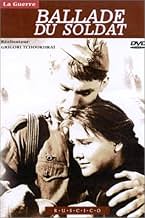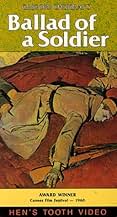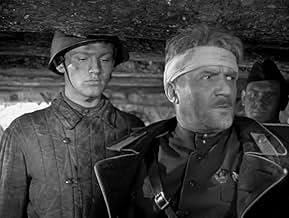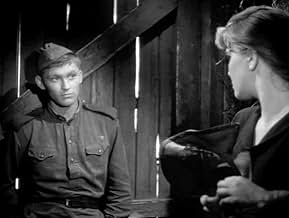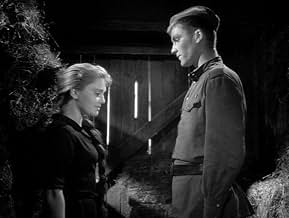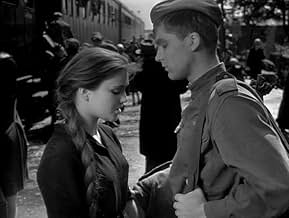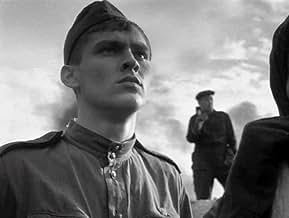CALIFICACIÓN DE IMDb
8.2/10
12 k
TU CALIFICACIÓN
Un soldado rechaza una medalla a cambio de seis días para volver a su aldea y ver a su madre.Un soldado rechaza una medalla a cambio de seis días para volver a su aldea y ver a su madre.Un soldado rechaza una medalla a cambio de seis días para volver a su aldea y ver a su madre.
- Dirección
- Guionistas
- Elenco
- Nominado a 1 premio Óscar
- 6 premios ganados y 4 nominaciones en total
Vladimir Ivashov
- Alyosha Skvortsov
- (as Volodya Ivashov)
Mariya Kremneva
- Elizaveta Petrovna (Pavlov's Wife)
- (as M. Kremnnyova)
- Dirección
- Guionistas
- Todo el elenco y el equipo
- Producción, taquilla y más en IMDbPro
Opiniones destacadas
10Rueiro
This is one of the greatest anti-war movies ever made and a touching little human drama that has not lost any of its power after half a century. After fifteen years since I first saw it, it remains among my ten favourite movies of all time from any country. It is full of poetry and visual beauty; a humble masterpiece from a young director at that time, who encountered all sorts of problems and restrictions during the shooting. Nevertheless, his perseverance to bring this work to life and the touchingly realistic performances of the cast make of this movie not only one of the best films that ever came out of the Soviet Union but also a classic gem of world cinema.
Comedians used to poke fun at Soviet movies during the Cold War era. The claim was that every Soviet film could be characterized by a single standard plot line—"Boy meets tractor, Boy falls in love with tractor, Boy marries tractor". Now, I'm not sure how accurate the wags were since Soviet films were never shown here, nor ours there. But, given Soviet emphasis on collective farming, and their theory that art should follow politics, that sort of result wouldn't be surprising.
Nonetheless, Soviet-made or not, this 1959 humanist gem shines like a proverbial pearl in the night. Sure, the boy and girl are idealized, but were there ever two more charming performers; they even look alike. Moreover, it's that natural glow amidst the seediest surroundings that suggests what some might call a triumph of the human spirit. After years of slickly contrived Hollywood pairings, I was captivated by a warmth and chemistry seemingly so unforced and unrehearsed that I marvel at how it was done. In my book, it's one of the great compelling love stories of the big screen.
Just as importantly, the movie is anti-war, but subtly so. We do see some devastation and combat, but the real indictment lies elsewhere. It rests with all the potentials cut short by unrelenting demands of the war machine. The boy must return to his unit or risk being shot as a deserter. Thus he must abandon the injured soldier with whom he could have been friends; he must risk losing the love of his life because trains must run on wartime; he must leave his mother, without even time to fix the leaky roof. But most of all, war demands that he, like so many fine young men, must leave life with a personal potential that will go tragically unrealized. As one of Chukrai's effects brilliantly illustrates, war is indeed a world turned upside down.
Also, there are the stunning visuals. Those vast Russian steppes may be flat and boring. Nonetheless, the corresponding big sky makes a magnificent backdrop for heroic low-angle shots of those dwelling amidst the vastness. Then there's that long dusty road at film's end, leading off into a great unknown that Alyosha must now travel. In contrast are the teeming crowds at the railway station, looking nothing like Hollywood in their simple cloth dresses and shirts. And what concern with fancy hair-do's can the women have when their hair is bound down with knotted kerchiefs. All in all, it's a revealing look at what could be called the Russian peasantry of the time.
No, the movie clearly doesn't come from the ministry of propaganda. Still, there are concessions. Note how cooperative strangers become no matter how initially cranky they are. The army officers especially are portrayed as understanding and non-threatening. Nobody is depicted negatively, except maybe the disloyal wife. Not even the Nazi enemy responsible for 20 million Russian dead is mentioned, let alone, vilified. No, the real antagonist here is war itself; the point is not stated, but it is shown to an uncommonly moving degree. The dedication at film's end may be to the Russian soldier, but the subtext throughout aims at the universal, regardless of time, place, or nationality.
Thus 50 years later, the movie remains a timeless humanist classic. And with it, I think Chukrai deserves a place alongside the early masters of Soviet film, that is, before the Stalinist tyranny descended. Now, I have nothing against tractors. In fact, I wish Hollywood would feature more such life-affirming inventions than the exploding cars they so love and worship. Nonetheless, I guess I'm glad that here, there's not a single tractor in sight.
Nonetheless, Soviet-made or not, this 1959 humanist gem shines like a proverbial pearl in the night. Sure, the boy and girl are idealized, but were there ever two more charming performers; they even look alike. Moreover, it's that natural glow amidst the seediest surroundings that suggests what some might call a triumph of the human spirit. After years of slickly contrived Hollywood pairings, I was captivated by a warmth and chemistry seemingly so unforced and unrehearsed that I marvel at how it was done. In my book, it's one of the great compelling love stories of the big screen.
Just as importantly, the movie is anti-war, but subtly so. We do see some devastation and combat, but the real indictment lies elsewhere. It rests with all the potentials cut short by unrelenting demands of the war machine. The boy must return to his unit or risk being shot as a deserter. Thus he must abandon the injured soldier with whom he could have been friends; he must risk losing the love of his life because trains must run on wartime; he must leave his mother, without even time to fix the leaky roof. But most of all, war demands that he, like so many fine young men, must leave life with a personal potential that will go tragically unrealized. As one of Chukrai's effects brilliantly illustrates, war is indeed a world turned upside down.
Also, there are the stunning visuals. Those vast Russian steppes may be flat and boring. Nonetheless, the corresponding big sky makes a magnificent backdrop for heroic low-angle shots of those dwelling amidst the vastness. Then there's that long dusty road at film's end, leading off into a great unknown that Alyosha must now travel. In contrast are the teeming crowds at the railway station, looking nothing like Hollywood in their simple cloth dresses and shirts. And what concern with fancy hair-do's can the women have when their hair is bound down with knotted kerchiefs. All in all, it's a revealing look at what could be called the Russian peasantry of the time.
No, the movie clearly doesn't come from the ministry of propaganda. Still, there are concessions. Note how cooperative strangers become no matter how initially cranky they are. The army officers especially are portrayed as understanding and non-threatening. Nobody is depicted negatively, except maybe the disloyal wife. Not even the Nazi enemy responsible for 20 million Russian dead is mentioned, let alone, vilified. No, the real antagonist here is war itself; the point is not stated, but it is shown to an uncommonly moving degree. The dedication at film's end may be to the Russian soldier, but the subtext throughout aims at the universal, regardless of time, place, or nationality.
Thus 50 years later, the movie remains a timeless humanist classic. And with it, I think Chukrai deserves a place alongside the early masters of Soviet film, that is, before the Stalinist tyranny descended. Now, I have nothing against tractors. In fact, I wish Hollywood would feature more such life-affirming inventions than the exploding cars they so love and worship. Nonetheless, I guess I'm glad that here, there's not a single tractor in sight.
In the 1950s, 2 very critically acclaimed Russian films were made. The first film was "The cranes are flying" by Mikhail Kolotozov. It is true that it was a good film but it was more of a love story. If there is a film which all human beings must watch, it is "Ballad of a soldier" made by the great Russian cinéaste Grigori Chukrai. I still have vivid memories of this film, although I saw it in 1986 on India's only public television network called "Doordarshan". What I like the most about this film is that it has tremendous emotional power to move anyone regardless of that person's ideologies or beliefs. It talks of war without begging for kindness, mercy or pity. Such is the greatness of this masterpiece. In my opinion," Ballad of a soldier" is not only the greatest Russian film ever made, it is one of the greatest world cinema gems too. For those who have not yet seen it, one word of advice. Throw away all your Hollywood flicks and watch this humanist masterpiece. PS :10 out of 10 is a understatement. "Ballad of a soldier" would easily fetch 100 out of 10.
Gregori Chukhrai makes a very powerful, and poignant protest against the horror and futility of war. There is no whining, no accusing, only a very real, and believable, look at the effect that it has on some very ordinary people. People that each of us can relate to. I have to classify this as my all time favorite war movie. If you have a choice, watch it with the Russian language, and subtitles. The warmth is missing in the overdubbed voices, in the dubbed version. Although my Russian is as limited as possible, the emotion that is portrayed by the vocalizations of the actors, is powerful. One is certain to fall in love with either Vladimir Ivashov, or Zhanna Prokhorenko. This is one of those rare films, that each time one watches it, one gleans more from it, and feels that much closer to the film, the director/writer, and to the actors.
"A single death is a tragedy; a million deaths is a statistic" is the famous quote by Stalin. In this movie we see a marvellous illustration of the sentiment.
Don't worry; I didn't spoil anything. We learn from the opening narration that this is the story of a fallen hero. With that in mind, the atmosphere of impending tragedy colours the entire film despite the film's rather charming presentation. It's a wonderful irony, because the director opens with such a powerful & nihilistic statement, but then he follows with a sweet and inspiring presentation which you might even call "innocent".
I'm not exactly a fan of war movies, but I don't consider this to be one at all. There are very few details about the war, no politics, no propaganda. Essentially you can replace the Russian uniforms with British, German or Japanese, and the story would remain the same--"The Ballad of a Soldier". Oddly enough, it's the compelling portrayal of rustic life (which he encounters along his journey) that provides the backbone and theme of this film, a very human story.
It reminds me of the Italian classic "Bicycle Thieves" as well as the Japanese masterpiece "Ikuru" by Kurosawa. Each scene packs a lot of heart, and the grand finale brings it all together poetically and artistically. I won't mention any names, but I sure wish certain other artsy Russian directors could be as lucid and authentic in their presentations.
One more thing... I can't end this review without mentioning the SUPERB MUSIC. The composer is listed as Mihkail Ziv, but IMDb offers no biographical info on him. The melody is powerful and epic while being traditional and intimate at the same time. It really mirrors the theme of the film perfectly: things of great importance come in simple packages.
This movie gets 9 stars from me, which is about the highest rating I ever give. See it if you ever get the chance.
Don't worry; I didn't spoil anything. We learn from the opening narration that this is the story of a fallen hero. With that in mind, the atmosphere of impending tragedy colours the entire film despite the film's rather charming presentation. It's a wonderful irony, because the director opens with such a powerful & nihilistic statement, but then he follows with a sweet and inspiring presentation which you might even call "innocent".
I'm not exactly a fan of war movies, but I don't consider this to be one at all. There are very few details about the war, no politics, no propaganda. Essentially you can replace the Russian uniforms with British, German or Japanese, and the story would remain the same--"The Ballad of a Soldier". Oddly enough, it's the compelling portrayal of rustic life (which he encounters along his journey) that provides the backbone and theme of this film, a very human story.
It reminds me of the Italian classic "Bicycle Thieves" as well as the Japanese masterpiece "Ikuru" by Kurosawa. Each scene packs a lot of heart, and the grand finale brings it all together poetically and artistically. I won't mention any names, but I sure wish certain other artsy Russian directors could be as lucid and authentic in their presentations.
One more thing... I can't end this review without mentioning the SUPERB MUSIC. The composer is listed as Mihkail Ziv, but IMDb offers no biographical info on him. The melody is powerful and epic while being traditional and intimate at the same time. It really mirrors the theme of the film perfectly: things of great importance come in simple packages.
This movie gets 9 stars from me, which is about the highest rating I ever give. See it if you ever get the chance.
¿Sabías que…?
- TriviaThe can of meat the train guard is eating from was clearly marked: "U.S. Meat". This would have been correct in actual life due the United States' Lend Lease with the Soviet Union.
- ErroresThe movie is set in July 1942 (a news report over loudspeakers mentions a Soviet retreat from Rostov and Voronezh). Yet the film depicts German Tiger and Soviet T 34/85 tanks, which came into service, respectively, in mid 1943 and early 1944.
- Citas
Alyosha Skvortsov: Comrade General, instead of my decoration, could I go home to see my mother?
- ConexionesFeatured in Fejezetek a film történetéböl: A szovjet film 1953-1970 (1990)
Selecciones populares
Inicia sesión para calificar y agrega a la lista de videos para obtener recomendaciones personalizadas
- How long is Ballad of a Soldier?Con tecnología de Alexa
Detalles
- Tiempo de ejecución1 hora 28 minutos
- Color
- Mezcla de sonido
- Relación de aspecto
- 1.37 : 1
Contribuir a esta página
Sugiere una edición o agrega el contenido que falta

Principales brechas de datos
By what name was La balada del soldado (1959) officially released in India in English?
Responda
